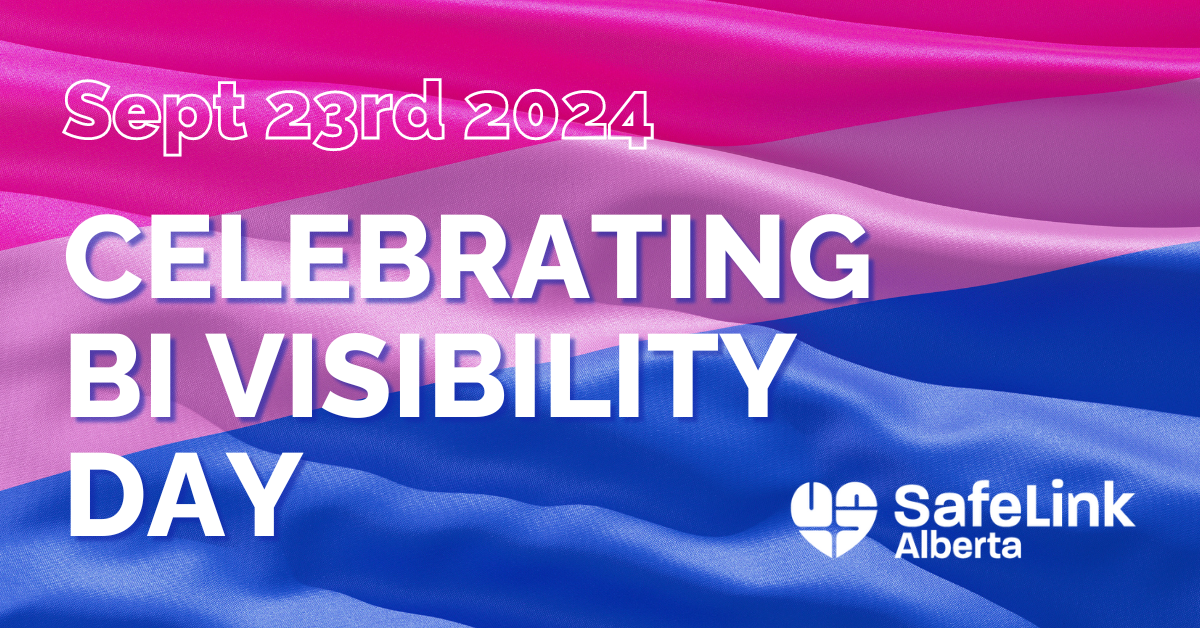This article was written Kayla Smith, Systems Navigator, Medicine Hat Support Services. Editing by Oluwaseun Ayodeji Osowobi and Alisha Ostberg.
Table of Contents
What is Bi Visibility Day?
September 23 marks Bi Visibility Day, also known as Bisexual Pride Day, celebrated annually since 1999! This Day, formally known as International Celebrate Bisexuality Day, was established by three bisexual activists from the USA: Wendy Curry from Maine, Michael Page from Florida (who also created the bisexual flag), and Gigi Raven Wilbur from Texas. It celebrates Bi folks and bi history and brings attention to Biphobia. The “B” in 2SLGBTQIA+ stands for “bi,” after all.

What Does Being Bisexual Mean?
In the past, the term “bisexuality” was used to indicate an attraction to both men and women. However, language evolves along with culture, and Bi is now an umbrella term that represents an attraction to two or more genders. This can include sexual or romantic attraction or both! Non-binary folks are also included in bisexuality.
Note on the Gender Binary
It is important to note that the term bisexuality is not here to reinforce the gender binary. With this change in the definition of bisexuality, some people may wonder why folks don’t just use the term pansexuality when talking about being attracted to more than two genders. Pansexuality is an attraction to people regardless of their gender. But also, identity is personal, and people may choose whatever resonates with them (or they may not choose a label at all if none of them feel right).
What is Biphobia?
Many Bi folks experience biphobia. While linguistically, biphobia means a fear of Bi people, it is more nuanced. Biphobia is defined as an aversion toward bisexuality or people who are identified or perceived as being bisexual. Similarly to homophobia, it refers to hatred and prejudice specifically against those identified or perceived as being in the bisexual community. For a lot of folks, experiences of biphobia may come from other folks in the queer community. There are a bunch of misconceptions about bisexual folks.
Are Bi People More Promiscuous?
A common misconception is that because bisexual people are attracted to more than one gender, they are more promiscuous or are likely to cheat. However, a person’s sexuality does not determine how much sex they have or how many sexual partners they may have, or their likelihood to cheat. Some Bi folks have been told they need to “pick a side,” either gay or straight. This is deeply dismissive of their identity and lived experiences. I have seen a lot of online policing around people’s sexuality within the queer community itself.
If a Bi Person is in a “Straight Presenting Relationship,” are they straight?
Someone’s identity does not change based on who they are currently in a relationship with or their sexual partner. For example, a Bi person in a “straight-presenting relationship” (which assumes people’s gender and sexuality) is still Bi, not straight. Our identities are part of who we are, which can be dynamic and change over time, but identity is not based on who our current partner is.

What is Bi-Erasure?
There is also bi-erasure, which is essentially the belief that Bi folks don’t exist, ofte manifests as people claiming someone “can’t” be Bi if they’ve only been in relationships or sexually involved with one gender.. People may dismiss it as a “phase” or a preemption to coming out as only having same-sex attraction. Neither of these assumptions are correct. Bi people are bi regardless of their sexual history, and it is a valid identity separate from other queer identities.
These harmful messages can also lead to internalized biphobia, causing Bi folks to feel invalid or disconnected from the 2SLGBTQIA+ community. They may hide their identity or feel like an impostor, which can cause distress or lead to isolation from other queer folks. Community is crucial in providing support, sharing experiences, and fostering solidarity, which helps prevent isolation.
Biphobia can also contribute to health disparities for Bi folks, affecting both mental and physical well-being. People may miss out on accessing queer-affirming health care if they are not connected to the community. Community is often where people learn about Queer affirming spaces and services.

How SafeLink Alberta Serves Bi People
Queer-affirming health care is critical to providing STBBI education, prevention, testing, and treatment. SafeLink Alberta is dedicated to providing inclusive and affirming care and services to everyone who enters our doors. At our drop-in spaces in Calgary and Medicine Hat, we offer basic food and hygiene supplies, safer sex and substance use supplies, systems navigation, and an afternoon drop-in space in both Calgary and Medicine Hat.
Happy Bi Visibility Day! You are perfect and wonderful, just as you are! Your identity is valid; you do not have to prove it to anyone!
Need Support?
Newsletter Signup
Please click the button below to provide your consent to receive messages SafeLink Alberta. This is important so you don’t miss out on updates about our events, presentations, programs and services.
Thank you!
By submitting this form, you are consenting to receive marketing emails from: . You can revoke your consent to receive emails at any time by using the SafeUnsubscribe® link, found at the bottom of every email. Emails are serviced by Constant Contact

